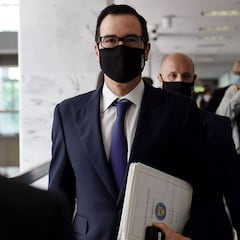$600 unemployment benefits boost in US: when does it end?
As part of the CARES Act, a $2.2tn coronavirus relief package passed in March, unemployed Americans have been receiving expanded jobless benefits.

An expanded unemployment benefits scheme in the United States is due to finish at the end of July, with claimants typically expected to receive their final extra payment this coming weekend.
$600 unemployment benefits boost until end of July
As part of the CARES Act, a $2.2tn coronavirus relief package approved in late March, out-of-work Americans have been receiving an additional $600 a week on top of their basic jobless benefits, amid soaring unemployment in the country.
Officially known as the Federal Pandemic Unemployment Compensation (FPUC) program, the benefits boost expires "on or before 31 July", according to the terms of the CARES Act. Allied with this ambiguous end date, the system by which states process unemployment insurance payments means people are likely to be sent their final extra $600 almost a week before the end of the month.
Final $600 payments set to go out on 25, 26 July
CNBC notes that states tend to pay out benefits on weekly cycles beginning and ending on a Saturday or Sunday. 31 July is a Friday this year, so "because of the wording of the CARES Act, that means states will send the extra payments on July 25 or 26, rather than on the very last day of the month", the media outlet explains.
An extension of the $600 boost until 31 January 2021 was included in the HEROES Act, a $3tn stimulus bill passed by the House of Representatives in May, but the package has come up against Republican resistance in the GOP-controlled Senate.
US lawmakers were due to begin discussing a less expensive relief bill - Senate Majority Leader Mitch McConnell has insisted on a $1tn limit - when they returned from a two-week break on Monday. With the House set to begin a five-week recess on 3 August (seven days before the Senate also goes on holiday), Congress’ lower and upper chambers need to agree a package by 31 July if President Donald Trump is to sign it into law before September.
Republicans eye lower weekly benefits boost
According to a report in the Washington Post at the weekend, Republicans are keen that any benefits boost included in the bill should feature a lower weekly amount of around $200 to $400 - a reduction that is in line with recent comments made by the likes of McConnell and Steve Mnuchin, the US secretary of the treasury.
McConnell last month described the $600 weekly figure as a "mistake", amid Republican concerns that it has discouraged some from seeking work by paying them more than they would normally earn.
"Unemployment [pay] is extremely important,” he said, “and we need to make sure, for those who are not able to recover their jobs, unemployment is adequate. That is a different issue from whether we ought to pay people a bonus not to go back to work. And so I think that was a mistake. And we're hearing it all over the country that it's made it harder actually to get people back to work."
Speaking to CNBC, meanwhile, Mnuchin has said post-July benefits are expected to be “no more than 100% [of a worker's usual salary]”, adding: "We want to incentivize people to go back to work.”
Unemployment in US currently at 11.1%
Unemployment has rocketed in the US as a result of the economic impact of the coronavirus pandemic. The country’s jobless rate rose to 14.7% in April and, although it has since gone down, the current percentage of 11.1% remains almost 8% higher than February, when it was just 3.5%.
"Additional income support will be needed"
Against this backdrop, recent research by Columbia University’s Center on Poverty and Social Policy has found that CARES Act measures such as expanded benefits and stimulus checks have had a significant effect on the finances of American households. Indeed, the CPSP says poverty in the country could have risen from 12.5% to 16.3% without the stimulus money.
Related stories
However, if high rates of unemployment continue into August, the CPSP has warned, "additional income support will be needed" to prevent a spike in the number of people in the US experiencing economic hardship.
Live coverage of the coronavirus pandemic
As of Wednesday morning ET, the coronavirus pandemic had led to 3,902,135 cases and 142,068 deaths in the United States, which has by a distance been the world’s worst-affected country. You can stay up-to-date with the latest US developments in the Covid-19 crisis by following our dedicated rolling feed.

